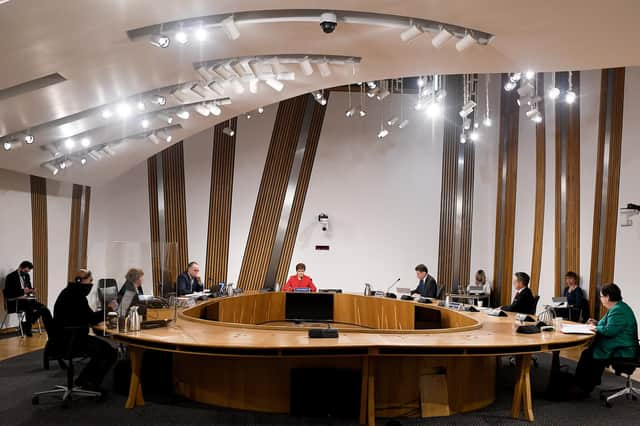Alex Salmond inquiry: The key findings by MSPs


The MSPs have concluded the Scottish Government was responsible from an early stage “for a serious, substantial and entirely avoidable situation that resulted in a prolonged, expensive and unsuccessful defence” of a judicial review, which cost taxpayers more than £500,000 and that “those responsible should be held accountable”.
In their report they also voiced their frustration at the delays they experienced, and condemned the government for forcing it to "repeatedly seek documents and to extend deadlines for receiving the information”, stating its scrutiny role was “significantly impeded”.
Advertisement
Hide AdAdvertisement
Hide AdIndeed it says that as a result of redactions, many documents they did receive were “insufficient to provide a complete picture of the events” and the late waiving of privilege of legal advice had “perhaps the most significant impact" on its work.


The committee also expressed "dismay” at the lack of note taking at meetings between ministers, civil servants and legal counsel and been “frustrated by the impression that on occasion it has not been given all of the relevant information simply because it has not struck upon all the right questions to ask to lead to the release of a particular additional detail”.
As a result the committee has made a number of recommendations:
Scottish Government and Parliament
Permanent Secretary Leslie Evans should publish a statement detailing the requirements under the Civil Service Code for record keeping and how the Scottish Government intends to improve its performance in meeting these requirements.
The Parliamentary Bureau should “explore the potential” for a new committee after the May elections to “look at the quality and standards of administration provided by the civil service in the Scottish Government in a similar vein to the role of the Public Administration and Constitutional Affairs Committee in the House of Commons”.
A protocol between the Scottish Government and the Parliament be developed setting out the general circumstances in which the Parliament would expect legal professional privilege to be waived in the future.
The Scottish Government should give “serious consideration” to introducing a system similar to the independent systems for reporting and investigating complaints at the Scottish Parliament and House of Commons, while consideration should also be given to an independent process for complaints against current Ministers.
The report states that the “Parliament may have insufficient powers to hold the executive to account” and recommends “the establishment of a commission to review the relationship between the executive and the legislature and make recommendations for change”.
The harassment procedure
Advertisement
Hide AdAdvertisement
Hide AdThe committee believes there is a case to amend the procedure “to allow for the first decision to be taken by a senior civil servant of director general level to ensure the person taking the final decision has not been previously involved in the complaint”.
It says arrangements for contact “should be clarified in the procedure in supporting guidance to ensure there is sufficient separation of roles” and it is “essential that contact is made with individual complainers by their employer in exercising that duty of care by informing them of what is happening and letting them know what are the next steps”.
They raise concerns that because Ms Evans contacted the complainers and because she was also the deciding officer on the complaint, “this left her open to accusations of having had inappropriate contact”.
As a result it recommends that like the investigating officer, the deciding officer “should have had no prior involvement with the complaints they are deciding upon”.
It points to the process employed by the Ethical Standards Commissioner for Scotland in the investigation of complaints made to it as a “robust approach” worth adopting.
The report also recommends immediate further guidance be drawn up “to avoid the same mistakes happening again”.
Alex Salmond
The committee report also criticises Mr Salmond for delays on his part, with his "initial submission received four months after the original deadline was set” and the MSPs say the actions of both the government and Mr Salmond "have given the appearance that only information and documentation that would advance a particular position has been willingly given”.
The report adds: "Despite saying that he had “upheld at every stage in this process” the anonymity of complainers, Mr Salmond, through his solicitors [Levy & McRae], on multiple occasions sent documents directly to committee members rather than using the committee’s document-handling procedure to ensure that no material which may inadvertently reveal the identity of a complainer is released.
Advertisement
Hide AdAdvertisement
Hide Ad“This resulted in unredacted documents being sent to members. Given the focus that the committee has had on confidentiality, this is a very serious situation."
Freedom of InformationThe report questions “the rationale” of the decision by Ms Evans by releasing information about the complaints under FOISA accompanied by a press statement and believes “the Scottish Government should reflect on its position in relation to making public such information in the future”.
Daily Record leak
On the leak of the complaints about Mr Salmond to the newspaper, the committee says it expects the government to undertake “a thorough review and implement demonstrable measures”, including any recommendations from the Information Commissioners Office, “to minimise the risk of this ever happening again".
Judicial Review
The report states the committee considers the “major flaw in the conduct of this judicial review was the significant failure to identify all the relevant documents at the outset”.
It adds: “It is inexplicable that these were not identified by October 2018 when the issue of prior contact was identified as a concern by counsel. The process for recovering of documents was fundamentally flawed and contributed to the awarding of the maximum expenses to the petitioner [Alex Salmond]. This also doubtless prolonged the length of the judicial review process.”
It asks that Ms Evans publishes the review she has said is underway of "corporate information management processes for storage, retrieval and deployment of corporate information”.
The report also recommends the government review its “compliance with its duty of candour, understand how a commission and diligence came to be required, how the government responded to it and its governance arrangements”.
However, while the report firmly puts the blame for a lack of information for the judicial review being carried out at an earlier stage on Ms Evans, saying the “individual failing is as significant as the general corporate failing”, not all the committee agreed to that statement. The SNP MSPs voted against it.
Scottish Ministerial Code
Advertisement
Hide AdAdvertisement
Hide AdThe committee has recommended the strengthening of the ministerial code, and also, to ensure in future that independent advisers "should be invited to review the referred actions against the ministerial code as a whole rather than being invited to consider specific sections”.
Lord Advocate
The report also looks at the dual role of the Lord Advocate as legal adviser to the Scottish Government and head of the Crown Office and Procurator Fiscal Service.
The committee says there is a “long-standing tension” in the Lord Advocate’s dual roles and wants "reassurance that the existing arrangements continue to command confidence in the independent exercise of these two important roles”.
A message from the Editor:Thank you for reading this article. We're more reliant on your support than ever as the shift in consumer habits brought about by Coronavirus impacts our advertisers.
If you haven't already, please consider supporting our trusted, fact-checked journalism by taking out a digital subscription.
Comments
Want to join the conversation? Please or to comment on this article.